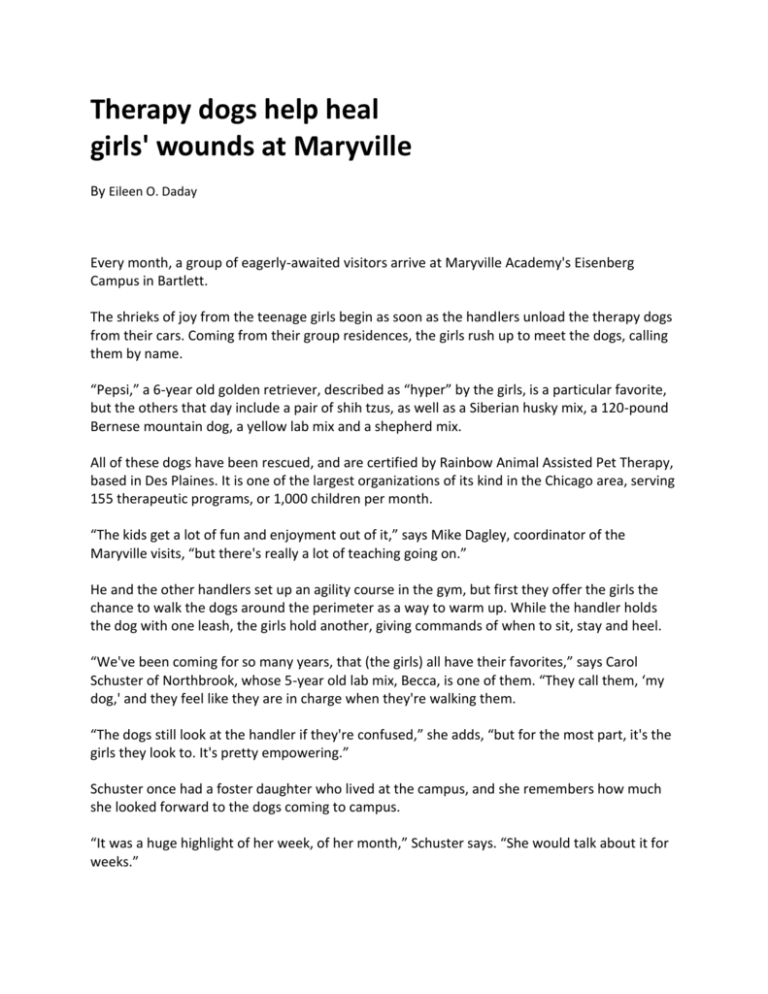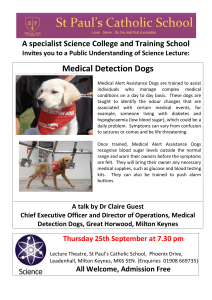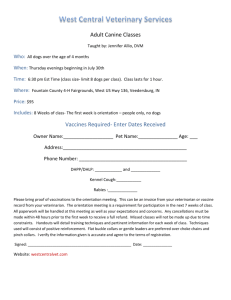
Therapy dogs help heal
girls' wounds at Maryville
By Eileen O. Daday
Every month, a group of eagerly-awaited visitors arrive at Maryville Academy's Eisenberg
Campus in Bartlett.
The shrieks of joy from the teenage girls begin as soon as the handlers unload the therapy dogs
from their cars. Coming from their group residences, the girls rush up to meet the dogs, calling
them by name.
“Pepsi,” a 6-year old golden retriever, described as “hyper” by the girls, is a particular favorite,
but the others that day include a pair of shih tzus, as well as a Siberian husky mix, a 120-pound
Bernese mountain dog, a yellow lab mix and a shepherd mix.
All of these dogs have been rescued, and are certified by Rainbow Animal Assisted Pet Therapy,
based in Des Plaines. It is one of the largest organizations of its kind in the Chicago area, serving
155 therapeutic programs, or 1,000 children per month.
“The kids get a lot of fun and enjoyment out of it,” says Mike Dagley, coordinator of the
Maryville visits, “but there's really a lot of teaching going on.”
He and the other handlers set up an agility course in the gym, but first they offer the girls the
chance to walk the dogs around the perimeter as a way to warm up. While the handler holds
the dog with one leash, the girls hold another, giving commands of when to sit, stay and heel.
“We've been coming for so many years, that (the girls) all have their favorites,” says Carol
Schuster of Northbrook, whose 5-year old lab mix, Becca, is one of them. “They call them, ‘my
dog,' and they feel like they are in charge when they're walking them.
“The dogs still look at the handler if they're confused,” she adds, “but for the most part, it's the
girls they look to. It's pretty empowering.”
Schuster once had a foster daughter who lived at the campus, and she remembers how much
she looked forward to the dogs coming to campus.
“It was a huge highlight of her week, of her month,” Schuster says. “She would talk about it for
weeks.”
Sheila Curtin of Palatine comes every month with Zach, her 7-year-old German shepherd mix.
When she's not coming to Maryville, Curtin chairs the “Read to Rover” program at the Palatine
Public Library, where children read to one of the therapy dogs.
She sees value in that program, but it's hard on Zach, who has to lie still for 45 minutes or so
while the child reads. He prefers the active play he gets with the girls at Maryville, who run him
through the agility course and play other games with him.
Curtin says she gains the most rewards from seeing how the dogs draw out girls who seem
fearful or withdrawn, at first.
“They sit up at the top of the bleachers, not wanting to join in,” Curtin says. “But gradually they
come down. In fact, we've never had one not want to participate.
“It's really exciting for me to see them overcome their fears,” she adds, “and give the dog some
commands.”
Rocco Cimmarusti, program director for Maryville's Eisenberg Campus, says the connection
starts early.
“These dogs have been rescued — and so are these girls,” he says. “They have all been abused
and come from some absolutely horrific backgrounds. And yet, there is clearly a message here,
that like these dogs, they don't have to give up, that someone can be nice to them, that they
can make it.”
He describes the contact with the therapy dogs as calming and healing, which is among
Maryville's main goals.
“One of our goals is to teach them that there are moments of safety, of trust, and that's what
we build on,” Cimmarusti says. “When you see these moments of trusting, then you see other
treatment taking effect.”
Copyright © 2012 Paddock Publications, Inc. All rights reserved.




